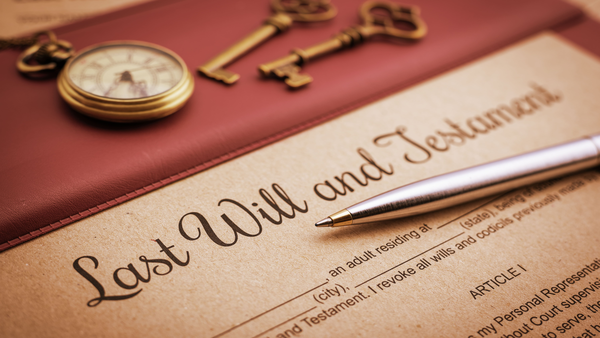Married couples often leave a large amount of their estate to their spouse when they make a will.
This is fine when you’re happily married. Of course, you want to make sure your spouse is protected if you pass away.
But what happens if your relationship breaks down and you get divorced?
Here’s a look at what happens to a Will after divorce.
Does divorce revoke a Will?
When you get divorced, you probably don’t want your former spouse to inherit from you when you pass away. In which case, you might be hoping that a Will you made naming your ex-spouse as a beneficiary is revoked upon getting divorced.
Unfortunately, this isn’t true.
Any Will you made while married remains valid after divorce and most of your directions will stand.
However, divorce does affect how your Will works if you pass away.
The good news is that your ex-spouse can’t inherit from your estate, unless you explicitly state otherwise.
The bad news is that your estate may not be distributed the way you would like it to be.
How does divorce affect a Will?
While getting divorced doesn’t invalidate a Will, there are important consequences that you need to be aware of.
#1 Your ex-spouse is automatically removed as a beneficiary
The most important effect that getting divorced has on your Will is that your ex-spouse is automatically removed as a beneficiary.
This might sound like a good thing, but it can seriously affect the way your estate is distributed.
When you get divorced, your former spouse is treated as though they had died on the day of your divorce. This means that anything that they were set to inherit from your estate will be passed on to the next beneficiary, as outlined in the Will.
This isn’t necessarily a problem if you included several beneficiaries in your Will. But if your spouse is the only beneficiary included in your will (which is often the case), you have a problem.
In this situation, your estate would be handled as though you had died without making a will, known as dying ‘intestate’. This means that your estate will be distributed through the laws of intestacy.
The rules of intestacy rank your relatives in a hierarchy of priority in terms of who should inherit from your estate.
These rules are strict – the only factor taken into consideration is how related you are. This means that your estate may not be distributed in line with your wishes.
For example, a new romantic partner wouldn’t be considered for inheritance under the rules of intestacy.
#2 Your ex-spouse is removed as an executor and/or trustee
Another effect that getting divorced has on your Will is that your ex-spouse can no longer act as an executor or trustee.
Your Will can still be implemented if you named several executors in your Will. However, if your ex-spouse was the sole executor, the court will need to appoint a replacement.
This will delay your wishes being carried out and cause your loved ones unnecessary stress at an already difficult time.
Furthermore, if you set up a trust fund with your ex-spouse as the sole trustee, the trust may fail altogether.
Should I make a new will after getting divorced?
You should update your will whenever your personal circumstances change, including when you get divorced.
While your Will is still valid after a divorce, it may not work for you in the way that you intended.
The main reason why you should make a new Will after getting divorced is so you can control who gets to inherit from your estate.
As we’ve seen, getting divorced when your ex-spouse is the only beneficiary means that your estate will be distributed under the rules of intestacy. You have no control over this, and it may not reflect your wishes.
Under the rules of intestacy, your children will inherit your entire estate. If you don’t have any children, other surviving relatives are next in line to inherit from you. Finally, if you have no surviving relatives, your entire estate will go to the Crown.
This means that your estate may end up going to relatives that you don’t get on with it. It may even end up finding its way into the hands of Her Majesty’s Government!
The rules of intestacy don’t take into consideration the important people that you may have in your life, from a new romantic partner to friends and charities.
Making a new Will after divorce allows you to:
-
Make sure that your estate is distributed in the way you want
-
Ensure that your new partner is looked after
-
Make sure your children are provided for, including any step-children
What happens to my Will after separation?
Your Will is unaffected if you separate from your spouse but you’re still legally married. This means that your spouse will be entitled to inherit as set out in the terms of your Will.
If you’re still legally married, but you don’t want your spouse to benefit from your estate, it’s important that you make a new Will that sets out your new wishes.
What happens to my Will if I remarry?
If you get married again after divorce, your existing will be revoked entirely, unless you explicitly stated otherwise in the Will.
This means that you will have no valid Will. So, if you die without making a new Will after a marriage, your estate will be dealt with as though you had died intestate.
You have no control over the rules of intestacy, and your estate may not go where you want it to.
Under the rules of intestacy, your spouse will inherit the entirety of your estate. This means that your children won’t be provided for, even if you would like them to inherit.
To make sure your estate is distributed the way you want, it’s important to make a new Will when you remarry.
How do I change my Will?
If you’re going through a divorce, separating, or planning to remarry, you should speak to a solicitor.
They’ll update your Will to reflect your new situation and make sure your wishes are followed.
The Law Superstore connects you with solicitors across England and Wales. Just type in a few details to compare prices and connect with professionals who’ll help you write a new Will.




